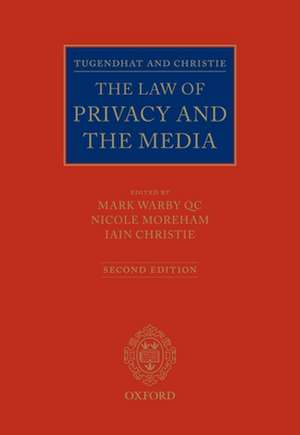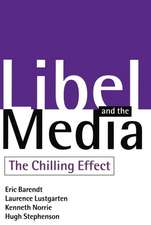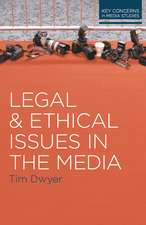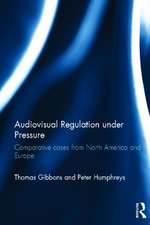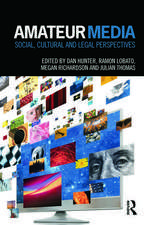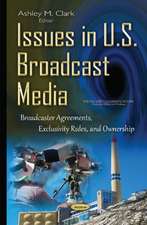Tugendhat and Christie: The Law of Privacy and the Media
Editat de Mark Warby QC, Dr Nicole Moreham, Iain Christie, Sir Michael Tugendhaten Limba Engleză Hardback – 16 mar 2011
Preț: 1937.42 lei
Preț vechi: 2551.43 lei
-24% Nou
Puncte Express: 2906
Preț estimativ în valută:
370.77€ • 402.60$ • 311.45£
370.77€ • 402.60$ • 311.45£
Carte tipărită la comandă
Livrare economică 24-30 aprilie
Preluare comenzi: 021 569.72.76
Specificații
ISBN-13: 9780199581153
ISBN-10: 0199581150
Pagini: 944
Dimensiuni: 170 x 244 x 49 mm
Greutate: 1.7 kg
Ediția:Revised
Editura: Oxford University Press
Colecția OUP Oxford
Locul publicării:Oxford, United Kingdom
ISBN-10: 0199581150
Pagini: 944
Dimensiuni: 170 x 244 x 49 mm
Greutate: 1.7 kg
Ediția:Revised
Editura: Oxford University Press
Colecția OUP Oxford
Locul publicării:Oxford, United Kingdom
Descriere
The first edition of this book quickly established itself as the leading reference work on the rapidly developing law of privacy in England and Wales, and the specialist team of barristers from 5RB(the media, entertainment and human rights chambers) and expert academic foreign law contributors have now prepared a timely new edition. Many of the contributors have appeared or advised in the leading cases which are shaping the law of privacy. The book considers how thelaw protects the publication of personal information without undermining the fundamental principle of freedom of expression. Since the first edition was published the law of privacy has developed considerably. As predicted by the authors, a separate and distinct cause of action, known as "misuse of personal information" has been created, though its precise remit is still being defined by the courts. Alongside this new tort or equitable remedy, traditional causes of action (most notably breach of confidence) remain available to provide remedies for invasions of privacy. The common law continues to be influenced bythe competing rights under Articles 8 and 10 of the European Convention on Human Rights and its concurrent Strasbourg jurisprudence and, to a lesser extent, by application of the principles established in the Data Protection Act 1998. The case law is developing on a case by case basis, drawing oncomparative legal and academic sources where appropriate. Against this background the debate as to whether Parliament should enact a general law of privacy rumbles on. Although intended as a practitioners' guide to the law, this major work includes a consideration of comparative and international jurisprudence, as well as leading academic writings on the subject, in order to elaborate the principles upon which privacy rights are based. These may helpfully guide the development of English law in the years ahead. The structure moves from the historical and contextual, through the academic and comparative, to the practical and developing law. At the heart of thebook is an explanation of existing causes of action which may be used to protect personal privacy and practical advice on defences and remedies that may be available. It is recognized that recent legislation, most notably the Data Protection Act 1998 and the Human Rights Act 1998, has had asignificant impact on the law in this area and full consideration is given to their application. A vast range of important recent case law is also analysed, including Max Mosley v News Group Newspapers Ltd, the J.K Rowling case and Terry v Persons Unknown. The topic of super-injunctions is addressed as are the latest proposals for reform of the law in this rapidly-developing and highly controversial field.The work was also cited favourably in the Court of Appeal judgment for KGM v News Group. This work was also cited favourably in the Court of Appeal judgment for KGM v News Group. Tugendhat and Christie: The Law of Privacy and the Media is essential reading for all those who act for or against the media, as well as all those with a general interest in the subject.
Recenzii
Tugendhat and Christie's The Law of Privacy and Media remains a valuable and comprehensive practitioners' reference book with a particularly useful comparative element in international jurisprudence, elaborating on the principles of privacy laws in other countries.
... an impressive tome and an essential text for anyone working in this field. The first edition of Tugendhat and Christie has been the bible for privacy lawyers for the last ten years, and this latest edition will retain that accolade. Perhaps even more impressive is the fact that the book is an improvement on the first edition.
The second edition maintains the high standards of the first and out to ensure this title retains its status as a work of unparalleled ambition and excellence.
The Law of Privacy and the Media, largely written by barristers, is obviously primarily a book for practitioners. It discusses English privacy law in great detail, with a comprehensive treatment of all the substantive and procedural issues relevant to this rapidly developing area of law. But it can also be warmly recommended to scholars interested in the subject; it provides a stimulating introduction to the principles justifying legal rights to privacy and to their protection incommon law and civil law jurisdictions. ...No self-respecting law library should be without a copy of this outstanding book.
... an impressive tome and an essential text for anyone working in this field. The first edition of Tugendhat and Christie has been the bible for privacy lawyers for the last ten years, and this latest edition will retain that accolade. Perhaps even more impressive is the fact that the book is an improvement on the first edition.
The second edition maintains the high standards of the first and out to ensure this title retains its status as a work of unparalleled ambition and excellence.
The Law of Privacy and the Media, largely written by barristers, is obviously primarily a book for practitioners. It discusses English privacy law in great detail, with a comprehensive treatment of all the substantive and procedural issues relevant to this rapidly developing area of law. But it can also be warmly recommended to scholars interested in the subject; it provides a stimulating introduction to the principles justifying legal rights to privacy and to their protection incommon law and civil law jurisdictions. ...No self-respecting law library should be without a copy of this outstanding book.
Notă biografică
Iain Christie is a barrister at 5RB specialising in the human rights aspects of media law, in particular the relationship between the right of personal privacy and the right to freedom of expression. Prior to joining 5RB he was a legal adviser to the Foreign & Commonwealth Office and acted for the Government in a number of high profile cases before the European Court of Human Rights. He has been the UK representative on various international negotiations at theUnited Nations and Council of Europe and has worked on several Parliamentary Bills including the Human Rights Act 1998. He is now on the Attorney General's panel of junior counsel to the Crown. Iain appeared in the House of Lords for the Claimants in Wainwright v Home Office, for which he was nominatedfor the Bar Pro Bono Award in 2003, and more recently for Michael Durant in his bid to overturn the controversial Court of Appeal ruling on access to personal data.
